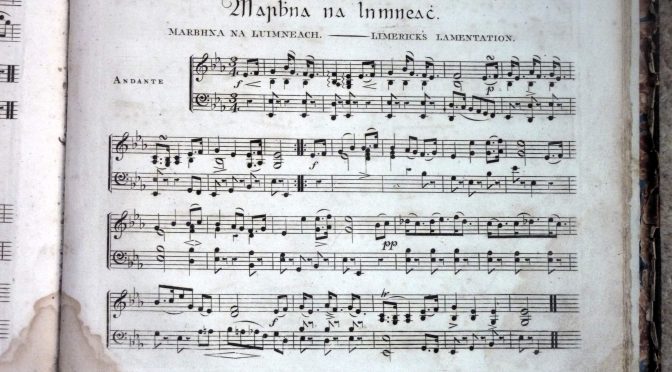For my 10-minute set in next Friday’s 1817 bicentenary concert, I have been thinking about what tunes to play, and how to approach them.
I was asked to play Port Gordon, since the band intend to play Bowie’s 1789 setting for fiddle and cello. I didn’t fancy trying my reconstruction of Bowie’s melody for the Queen Mary harp, since it seemed far too archaic for the 1817 theme. But checking my online notes about the tune I remembered the version of the melody copied in December 1816 by Anna-Jane MacLean-Clephane. Titled “Port 2nd”, it is one of a series of 10 numbered but unnamed ports in her music book, now in Trinity College Dublin (TCD MS 10615).
The earlier part of the book includes a whole series of Irish harp tunes said to have been taken via a manuscript of “Mr MacDonald”, from the playing of “O’Kane”. This was likely Echlin O’Kane who was up in the Western Isles in the late 18th century. But it seems likely that these 10 ports derive from a different source. They are very Scottish in provenance and origin, and they are presented as bare melody lines. All of the O’Kane Irish music is fully arranged for pedal harp (which Anna Jane and her sister Margaret played). I wonder if these “port” tunes may have come through Mull oral tradition on fiddle or even voice, originating from Gaelic harpers in the area in the early 18th century.
I made a MIDI version of the tune, and am working on inventing a plausible early 19th century bass:
 I was thinking about general issues of historical music, authenticity and recognition. I think that there may be a big extent to which historical music can be too niche, can put off people. There is something important about the natural naïvety of “just playing a wee tune” which is important in the tradition. And curiously, I feel that this 19th century swansong of the Gaelic harp traditions perhaps is the nearest thing I find to relevance, musically speaking. There’s no doubt that the medieval harps (the Trinity College and Queen Mary harps) are iconic objects, but the medieval Gaelic harp repertory is pretty obscure and does not find much popular resonance.
I was thinking about general issues of historical music, authenticity and recognition. I think that there may be a big extent to which historical music can be too niche, can put off people. There is something important about the natural naïvety of “just playing a wee tune” which is important in the tradition. And curiously, I feel that this 19th century swansong of the Gaelic harp traditions perhaps is the nearest thing I find to relevance, musically speaking. There’s no doubt that the medieval harps (the Trinity College and Queen Mary harps) are iconic objects, but the medieval Gaelic harp repertory is pretty obscure and does not find much popular resonance.
So I considered carefully what other tunes to play in my 10-minute set. I thought of Carolan’s Concerto as the most distinctive tune from the old harpers’ repertory, and I have Arthur O’Neill’s version up and running already, though of course it needs work to make it more solid.
I considered Lochaber, which I have played for many years. It is in one of Bunting’s notebooks, in a context suggesting it was collected from Patrick Quin in around 1800, though it’s not actually tagged Quin in any source – the annotated 1809 print (London BL Add ms 41508) just says “Harp”. I looked again at the 1809 piano arrangement, and started wondering if it had traditional harp elements in it. And I started playing it, to see what would happen.

My youtube shows a very hesitant, stumbling, and too-slow version of this. But I think I am enjoying going in this direction.

Hello! Great job! Where did you find the book of Edward Bunting? Could you add a link to download? Thanks!
Here is the 1809 book online: https://archive.org/details/generalcollectio00bunt_0/